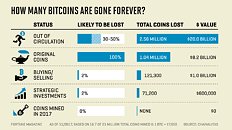Raevenlord
News Editor
- Joined
- Aug 12, 2016
- Messages
- 3,755 (1.24/day)
- Location
- Portugal
| System Name | The Ryzening |
|---|---|
| Processor | AMD Ryzen 9 5900X |
| Motherboard | MSI X570 MAG TOMAHAWK |
| Cooling | Lian Li Galahad 360mm AIO |
| Memory | 32 GB G.Skill Trident Z F4-3733 (4x 8 GB) |
| Video Card(s) | Gigabyte RTX 3070 Ti |
| Storage | Boot: Transcend MTE220S 2TB, Kintson A2000 1TB, Seagate Firewolf Pro 14 TB |
| Display(s) | Acer Nitro VG270UP (1440p 144 Hz IPS) |
| Case | Lian Li O11DX Dynamic White |
| Audio Device(s) | iFi Audio Zen DAC |
| Power Supply | Seasonic Focus+ 750 W |
| Mouse | Cooler Master Masterkeys Lite L |
| Keyboard | Cooler Master Masterkeys Lite L |
| Software | Windows 10 x64 |
Cryptocurrencies as they currently are implemented are one of the most divisive subjects among the tech and economic communities in recent years. No, really; it's reached a kind of "Hayek vs Keynes" level of argument in the later. But one thing can't be denied: some early adopters of the technology have cashed in thoroughly and profoundly on the leading cryptocurrencies. The fact that Bitcoin has appreciated some 340% in the last six months (around $7,300 value increase in a single coin of the cryptocurrency) means many people more will see unbelievable surges in their net worth. Today, a single Bitcoin is trading for around $9,530 - and this is a cryptocurrency that, in its infancy, was being used to trade at rates of thousands of Bitcoin per pizza.
However, as with every currency, there's inevitable losses; paper money has seen its fair share of that, and galleons and caravels filled with gold up to the mast used to sink in oceans all around the world. But cryptocurrency is a digital currency; it's impossible for it to deteriorate away, to be lost with your wallet, or any other exceedingly sad case of lost value. Right? Well, not so; it's encryption algorithm ensures that for users to be able to access the contents of their digital wallets, they have to know the password. And many passwords have been lost and forgotten. Some users have even thrown away HDDs with wallets containing thousands of Bitcoin, and some have even lost their hardware wallets.



A new study by blockchain analysts Chainalisys says that the amount of Bitcoins actually lost in the system is of around 3.79M coins - which today, would amount to around $20B lost, somewhere in random bits and bytes across the world. Remember that the total, finite supply of Bitcoin stands at 21M Bitcoins - this means around 20% of the total possible circulating value of this currency is already lost. Whether or not this amount of lost Bitcoin is already represented in the overall Bitcoin pricing remains to be seen (remember that lower supply usually translates to higher demand and correspondingly higher value).

View at TechPowerUp Main Site
However, as with every currency, there's inevitable losses; paper money has seen its fair share of that, and galleons and caravels filled with gold up to the mast used to sink in oceans all around the world. But cryptocurrency is a digital currency; it's impossible for it to deteriorate away, to be lost with your wallet, or any other exceedingly sad case of lost value. Right? Well, not so; it's encryption algorithm ensures that for users to be able to access the contents of their digital wallets, they have to know the password. And many passwords have been lost and forgotten. Some users have even thrown away HDDs with wallets containing thousands of Bitcoin, and some have even lost their hardware wallets.



A new study by blockchain analysts Chainalisys says that the amount of Bitcoins actually lost in the system is of around 3.79M coins - which today, would amount to around $20B lost, somewhere in random bits and bytes across the world. Remember that the total, finite supply of Bitcoin stands at 21M Bitcoins - this means around 20% of the total possible circulating value of this currency is already lost. Whether or not this amount of lost Bitcoin is already represented in the overall Bitcoin pricing remains to be seen (remember that lower supply usually translates to higher demand and correspondingly higher value).

View at TechPowerUp Main Site






